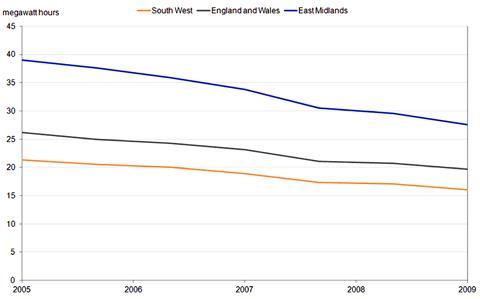Smart meters have to be part of the answer to cutting energy consumption in UK homes but we need to train occupiers in how to use them properly

Last month the Office of National Statistics (ONS) released the “Household Energy Consumption in England and Wales, 2005–11”. This confirmed that overall average domestic energy consumption fell by 24.7%.
This is an impressive reduction despite there being a slight issue with the data in that they show only gas and electricity use and therefore are likely to under-record energy use in more rural areas where oil, wood or other fuels are more common.
There are lots of interesting nuggets, such as average consumption in some areas of the East Midlands more than double that of some London councils, despite both predominantly having mains gas.
A temptation would be to assume that the reduction is due to the recession but the data suggest that if anything, the rate of reduction in energy consumption slowed during this time.

Although efficiency and insulation factors play a big part, behaviour is arguably both the easiest and most difficult factor to change in a building’s energy consumption. Working in the non-domestic sector we often find that savings of 20% or greater can be achieved through simple behavioural tweaks or small alterations to the way the building is managed. In this situation we are dealing with a professional facilities manager, but in residential properties it is much more difficult to address individual occupiers, and even when you can they may change in the next year.
Smart meters that allow the user to see their energy consumption at a given moment and over time, as well as communicate with the energy provider may seem like a golden opportunity here
This problem is likely to get worse in the future with growing use of technologies that are more complex and sensitive to management than gas boilers, such as heat pumps and mechanical ventilation with heat recovery. Recent research on MVHR in homes found exactly this kind of issue with very few systems installed or operated well, leading to poor performance.
You could argue energy bills are already there to motivate people to reduce energy consumption. However energy bills are still, for most of us, like mobile phone bills: variable. It is difficult to know when you are saving money or when you are not until you get a bill.
Smart meters that allow the user to see their energy consumption at a given moment and over time, as well as communicate with the energy provider may seem like a golden opportunity here.
We will all have smart meters by 2020 but, despite that, research, albeit limited, suggests people are unlikely to benefit fully from them. The University of Oxford has suggested that education will be crucial if people are to benefit from the meters and real time displays. Particularly if a charging model that charges different amounts at different times of the day is to be implemented as has been suggested. It will be crucial that occupants understand the system in order to avoid being penalised unfairly, especially as it is the vulnerable who will suffer most.
Would a solution be to require installers to provide thorough independent training to the occupiers on how to gain most benefit from these new meters? Alternatively could a government-sponsored person attend each installation and do this while the installation is undertaken?
Barry Evans is a CIBSE low carbon consultant, low carbon energy assessor, BREEAM and Code for Sustainable Homes assessor


























No comments yet